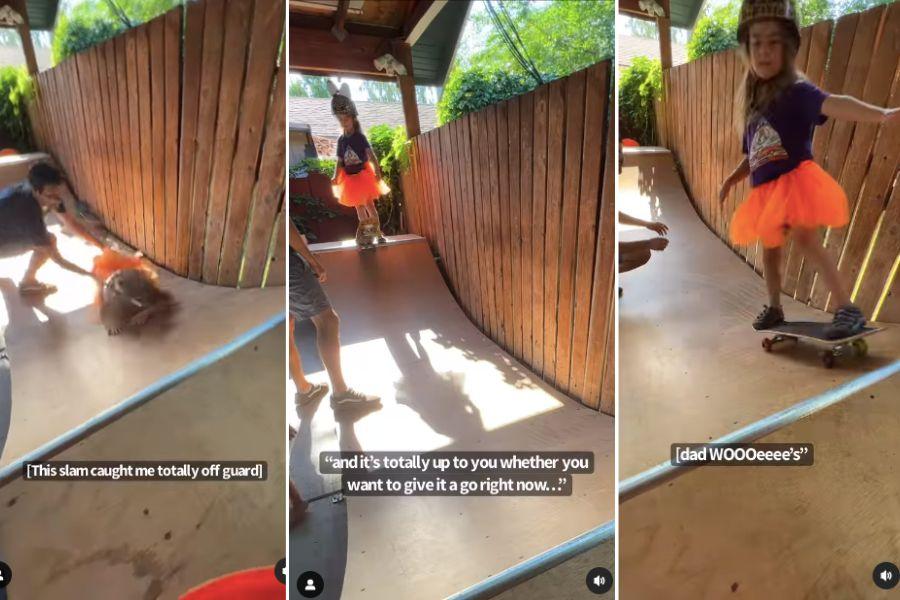As a parent, it’s not always easy to know how to help your kids learn from life experiences. Some lessons they learn naturally and others they learn through parental guidance, but discerning which is which and how those things overlap can be challenging.
Kids don’t come with instruction manuals, of course, but sometimes we see examples of great parenting we can point to and say, “AHA! That’s how it’s done.”
One such example comes from a dad named Robert. In 2022, he was teaching his 5-year-old daughter Aubrin to skateboard and set up a mini half pipe for her to learn on. In a video on Instagram, Robert shared an exchange he had with Aubrin after she crashed hard on the ramp during a lesson.
It’s a sweet video that doubles as a masterclass in effective parenting. Robert communicates with a perfect blend of empathy, encouragement, and empowerment, which gives his daughter exactly what she needs to tackle her fears and persevere in what she wants to do.
Even his initial question after she fell—”Did it scare you or did it hurt you?”—is helpful for making her more aware of what she’s actually feeling as well as knowing how best to help her.
Seeing this gentle parenting scenario play out is just so heartwarming. (And if Aubrin’s voice sounds familiar, you may have seen the viral “stuck-asaurus” video in which she offered delightfully colorful commentary while snowboarding in a dinosaur suit.)
Watch:
Robert explained his thinking behind the way he responded to Aubrin’s fall:
“Trying something new can be scary but re-trying something after slamming can be terrifying.
I had to re-gain her trust and she needed to re-establish her confidence after this slam and it was a tough but beautiful rollercoaster experience.
This is one of the biggest psychological battles we face as humans, because once that negative experience has made its home in our brain it’s very hard to get it out.
I know from intense personal experience that a bad fall can have long lasting [psychological] effects and truly believe, that when possible, it’s best to get back up and try it again with the goal being to end the session with a positive experience; to not have that negative memory ruminating in your head until the next time you return to try.
I’ve been asked a lot ‘How do you know what to say in these moments?’ and the truth is I absolutely don’t know what to say.
Seeing her slam sucks the air out of my lungs and my heart drops but I just try to stay calm and redirect with some questions or comments while surveying the situation. A parent’s emotions (depending on how you instinctively react) will oftentimes influence the child’s emotional response and it’s my goal to remove my influence and allow her to just be, to feel, to hurt at her pace and it allows me to get a better reading of how she’s truly feeling in these pivotal moments.
Ultimately I just respond from the heart. If you calmly lead with empathy and support without applying pressure you’ll do just fine.”
Beautiful insight and advice. Unfortunately, many parents are raising kids while working through wounds from their own childhoods, and when you’re battling parental instincts that aren’t particularly healthy or helpful, having it all laid out like this is really valuable. Commenters on Instagram and Reddit have expressed how much they appreciate seeing supportive parenting in action.
“I actually got emotional watching this…” wrote one person. “I am learning so much from your posts!!! As someone whose parents led from a place of fear a lot of the time, this is showing me so much possibility of what the opposite can look like. Thank you for being so open, we are all made the better from it.”
“I wish I had a dad like you growing up. She’s so lucky,” wrote another.
“Made me smile and also as a grown ass man, gave me watery eyes – as someone that never had this kind of treatment growing up and kind of needed it – this is the kind of dad I will be if I ever meet someone and have kids,” shared another.
Whether we were raised by gentle, supportive parents or the opposite, we can all recognize effective parenting when we see it. Thank you, Robert, for sharing such a stellar example we can all watch and learn from.
You can follow Robert and Aubrin’s family adventures on Instagram (@chasing.sage).
This article originally appeared three years ago.



































